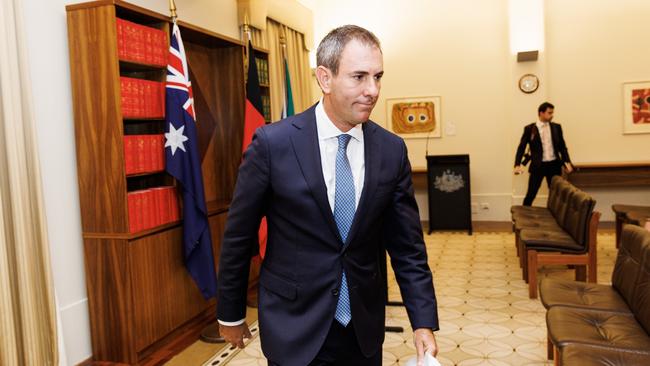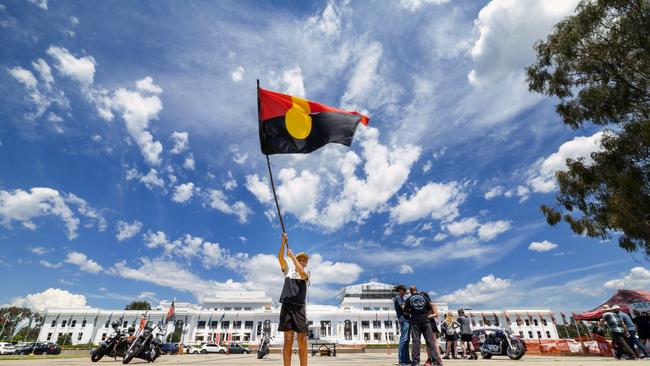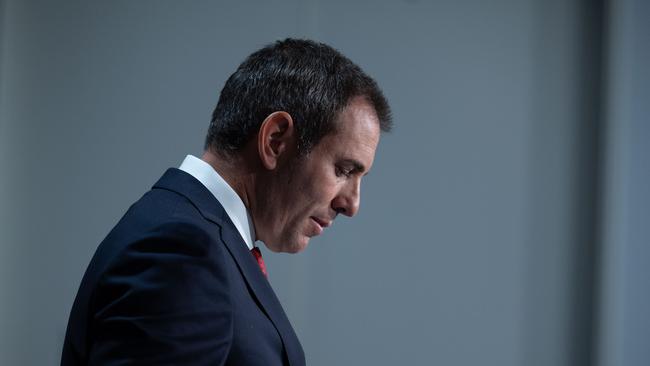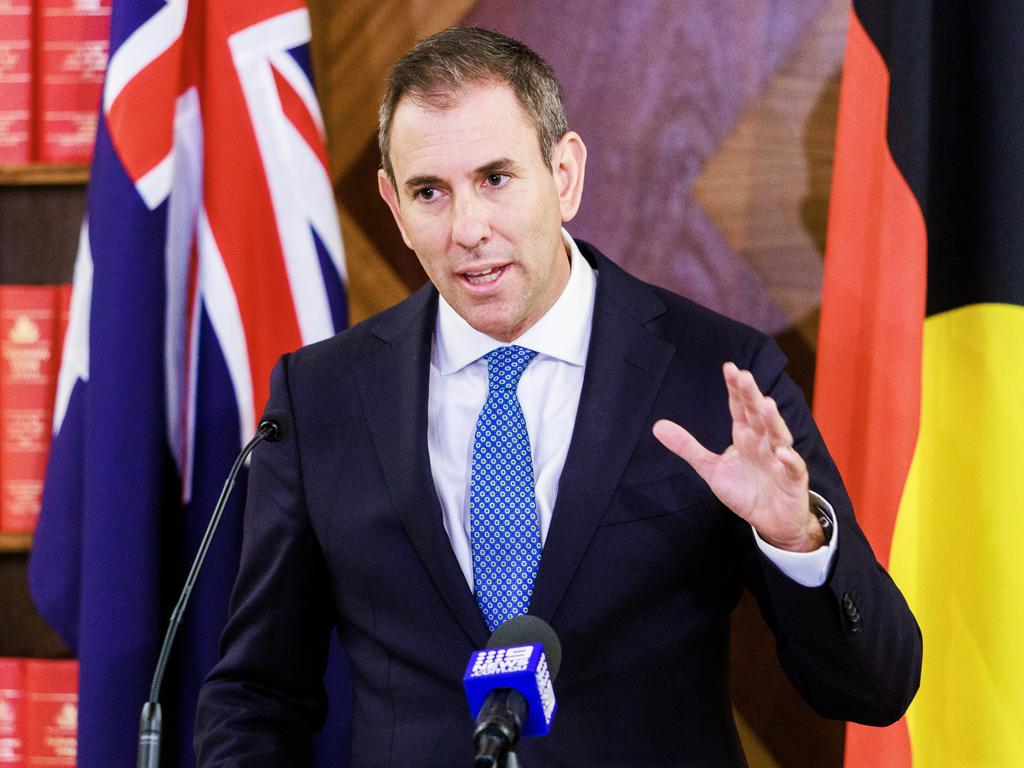The pros and cons of Jimonomics
What’s needed is not a new capitalism but a competitive and zippy economy.

Ahead of the restart of parliament, the Treasurer’s smash-hit about remaking capitalism has got a lot of attention for a wonkish essay and raised expectations on a government that is facing its make, or break, year.
Anthony Albanese is risking his personal prestige on landing a bold constitutional change of an Indigenous voice to parliament.
But there is even more to do in this powerplay year, given our rapid electoral cycles.
“Governing is a grind, one thing after another,” a Canberra veteran tells Inquirer, of the capital’s unyielding tempo. “Then a crisis comes along, you have to act quickly, and adjust your plans.”
Labor’s first eight months have been a reboot: taking stock and making good on election promises. One of the few jibes available to the electorally vanquished is that a new government has “hit the ground reviewing”.
Labor has ordered up major pieces of work on the migration system, Medicare, welfare adequacy and the Employment White Paper. Any day now, Angus Houston and Stephen Smith will deliver to government their final report on the Defence Strategic Review. An independent trio of experts is conducting a review of the Reserve Bank and will hand their report to the Treasurer next month.
Later this year, we’ll see the fruit of an expedited review of the design, operations and sustainability of the National Disability Insurance Scheme, whose cost is expected by Treasury to grow by 14 per cent a year over the coming decade.
As well, the Morrison government requested an inquiry into Australia’s productivity performance, the second in a regular series done every five years; the Productivity Commission is due to provide its final report to government this month.
This auditing, and there’s a whole lot more, will in no time require policy responses. As the capital source suggests, this workbook is essentially the Albanese government’s grinding reality for the rest of the term, with Chalmers the pivotal figure. Why the Treasurer and not the Prime Minister? Events, dear reader, events.

The challenges are pooling in Chalmers’ in-tray, as the economy slows to a crawl, the budget deficit takes on a portlier shape, households feel the bill shock of higher prices on essentials, sliding home values and mortgage stress, and unemployment starts to rise from a near five-decade low of 3.5 per cent.
Intervention is back in fashion. While markets don’t always deliver the results governments would like, they have a lot of spending, taxing and regulatory tools at their disposal to influence resource allocation to deliver the social outcomes they desire.
Labor is going to be busy “doing stuff”, being reactive and proactive, in this global era of “polycrisis” – and it will have to take citizens with it.
That’s the policy context for the Chalmers narrative extravaganza, with a neat overlay of the political and personal as well; Labor hopes to boost its dismal primary vote (32.6 per cent last May), grab more of the middle ground, and squeeze the Greens. Chalmers, too, needs broader appeal, within the party and without, to eventually succeed the prime minister.
Albanese puttered over the line on a minimalist change platform of compassion, cleaner energy and purging the nation of its least popular major party leader in several decades (although the victors have been rewriting electoral history ever since, claiming a chunkier mandate).
One way to think about the Chalmers treatise is that it’s an attempt to bring all this busywork under an electorally appealing and extended family-sized beach cabana, which encompasses the current global “values” vibe and enlarges the project of a modern social democratic party.
Chalmers is leading with his chin at the start of the political year. As a side hustle, it’s provided a lacklustre and lost opposition a cause, many causes in fact, to fire up about. Because the voice, safeguard mechanism on emissions reduction, and fiscal agenda are a bit “detaily”, it’s easier for the Coalition to bash up the essayist and fill the space between the Treasurer’s high concepts with whatever suits their fancy.
While there’s a lot going on in this week’s thesis in The Monthly, 5600 words on the page-proof count, it’s also the least that’s required if your base pledge is this big: reinventing a broken and unfair economic operating system and expounding how you’ll pursue your vision splendid.

The hard nuts will say explaining is losing and, besides, essays are for the professional voyeurs who write about those in the arena. In any case, you sense the Queenslander enjoys the blood sport, although now he has to put up or tone it down.
Speaking to Inquirer, several public policy experts contacted didn’t want to join the “pile-on”, as one described the backlash to the Treasurer’s foray. Most welcomed as “about time” Labor’s intention to refresh the Productivity Commission and Reserve Bank but would wait to see the fine print before passing judgment on new arrangements. Any talk of more “evidence” in policy design was also applauded.
But there was scepticism about whether Chalmers would be prepared to be as disruptive politically as he’d need to be to make the economy more competitive.
“The backsliding on industrial relations is a worry, although Chalmers has not been the front person in that crusade,” said one policy analyst who regularly deals with government.
As well, there were warning lights flashing in the real world, not least after the clumsy hand of the gas market intervention and its notion of determining “reasonable price”.
“As well, all these off-budget funds for housing, infrastructure, clean energy and manufacturing co-investments have the potential for cronyism,” said another seasoned economist.
A moderate, if diplomatically wary, view among this week’s on-the-record responses to Chalmers’ pitch was from former Liberal treasurer Peter Costello, who chairs the Future Fund and rival media company Nine.
Asked about the need for a new values-based capitalism, Costello played a flat bat: business should focus on shareholder returns, and superannuation funds should focus on maximising members’ nest eggs.
“Businesses are set up to run businesses,” he told a press briefing to report a 3.7 per cent loss for the $196bn sovereign wealth fund last year. “That’s when they operate best. They are not like governments. Governments are there to decide on social objectives.
“This idea that every institution must have every purpose will just lose focus,” he added. “Everybody knows what the rules are, and they can abide by them. That’s the way things have been done historically, and that enables both focus and accountability.”
It’s impossible for a non-partisan to see how Labor reaches social and economic nirvana without addressing budget repair, tax reform, housing affordability, spending restraint, reform to federalism, more competition and productivity growth, and a least-cost approach to emissions reduction.
In other words, “more market not less”, precisely the posture explicitly dismissed by the Treasurer as the failed “Washington consensus”, the orthodox approach once again suggested for Australia by the DC-based International Monetary Fund in its annual health check of our economy, published this week. Chalmers would demur, of course, arguing he’s working through the nominated to-do list.
In his critique of capitalism in the wake of three global crises over the past 15 years (financial, pandemic, inflation), Chalmers blamed the Coalition and chastised implicitly those pining for what in his telling is an outdated model of governing.
“Successive leaders failed to find their way conclusively or convincingly past the neoliberalism of the pre-crises period,” he writes.

“In other words, while the world was getting more uncertain, we had been growing more vulnerable. Domestic policies – and policy vacuums – accelerated rather than alleviated this problem.”
That policy vacuum was a long time in the making, capturing the cluelessness of Labor in the doghouse post-1996, the latter part of the Howard years, the internecine dysfunction of Rudd-Gillard, and the policy junkyard in the Coalition’s helter-skelter three terms.
The Morrison government’s pre-crisis timidity on reform followed by its Covid-19 spendathon does not fit the hard-core neoliberal identikit sketched by Chalmers.
And yet, despite this drift from the reform era and best practice, the Australian economy prospered on many metrics in the decades before the pandemic, as the world bought our products, sent their young to be educated and work here, and gave us income rises over and above our productivity performance.
There is froth to the fiscal bottom line; for calendar 2022, Canberra was only slightly in the red, as high export prices caused a surge in profits and fed a higher tax take. That won’t last, and the IMF urged the government to again bank any revenue upgrades in the May budget to help the Reserve Bank contain inflation.
In line with the RBA, Treasury and market economists, the IMF predicts Australia won’t experience a recession this year or next.
Behind this high-sugar prosperity – just look at our house prices – our production system was lagging the global frontier, the budget was overly geared, and we began laminating in a more expensive social compact on temporary revenues.
The stressed budget Chalmers confronts, with unhelpful spending and taxing dynamics in coming years, demands structural repair; the growth engine to pay for a bigger, older Australia needs rebuilding.
Our ailing, sub-par economy needs more dynamism, which in turn will deliver higher productivity growth and better living standards.
Former Labor adviser Tom Cameron tells Inquirer that competition policy, “a key lever for reshaping our economy in the interests of consumers”, is one of those neglected spaces.
“Most governments in the developed economies are right now pointing their political guns at household cost of living,” says the political consultant at Counsel House.
“But doing this without loading competition policy into the chamber is akin to using a water pistol instead of a weapon. Chalmers is spot on – the vacuum is the vulnerability.”
Assistant Minister for Competition, Charities and Treasury Andrew Leigh has spoken about the need for a “zippier economy”, where labour and capital move more freely to their most productive uses; where business entries and exits are less inhibited; where innovation thrives.
“The Albanese government believes good competition is the bedrock of our economy,” Leigh, an economics professor pre-politics, said in November.
“Like Adam Smith and countless economists since, we recognise that competitive markets are vital to ensuring that the consumers and workers get a fair deal.”
Adam Smith? Someone grab the defibrillator for Albo!
The fair deal that came out of the national competition reforms outlined by Fred Hilmer in the 1990s was one of the factors behind our productivity surge during that decade.
On one estimate, Leigh said the average household today is $5000 a year better off because of those reforms.
Writing in our pages at the time, Leigh argued for more reforms to reduce the market power of large enterprises and new consumer protections.
“The Australian economy today desperately needs a good dose of competition,” he wrote.
“A new wave of competition reforms could deliver better prices and more consumer choices. It could help improve living standards of Australian households by increasing access to the latest technologies.”
If Chalmers is intent on playing the long game, shaking up competition in this country is likely to deliver on many fronts.
That won’t be an easy conversation with powerful incumbents (labour and capital), but it would easily fit under the big umbrella of fairness, opportunity, innovation, openness and growth that an improved capitalism would entail.
A zippier economy is not a radical makeover of capitalism, but it’s the enabler for the big things the Treasurer has put up in lights.








Jim Chalmers is in danger of wearing the nickname “Big Show”, declaring a week ago “2023 will be the year we build a better capitalism, uniquely Australian”. It’s the political economy equivalent of a cocky cricketer pointing his bat to the MCG boundary with a demon quick at the top of his mark – before every ball!